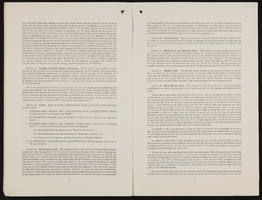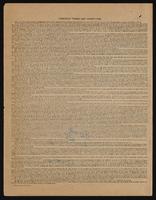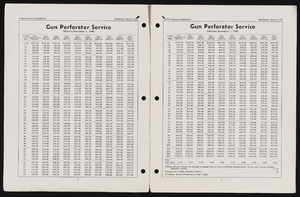Search the Special Collections and Archives Portal
Search Results
Southern Nevada Jewish Heritage Project
"The goal of this 2014-2015 project is to build a web and mobile resource that will connect researchers from around the world to thousands of historical items—photographs, brochures, scrapbooks, letters, drawings, videos, and more—detailing the lives and contributions of Jews in Southern Nevada. It will include carefully researched biographies, timelines, and histories of institutions, events, and prominent themes showing the integral roles Jews have played in the history of Southern Nevada.
Corporate Body
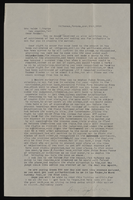
Correspondence, Levi Syphus to Sadie George
Date
Archival Collection
Description
Text

Transcript of interview with Jan Kennedy by Barbara Tabach, September 7, 2011
Date
Archival Collection
Description
Jan Kennedy was born (1924) Janet Parmelee, the daughter of a Connecticut physician and a homemaker. In high school she met Norman Kennedy, who she would marry after both had attended college and to whom she was married for 64 years. Until 1963, their roots seemed to be taking hold in the Seattle area. That is until Norm was offered an attractive career opportunity as a weather man at the Nevada Test Site. They settled in and enjoyed a zest-filled life with their four sons and a dynamic group of friends who they often entertained at their cabin in Mount Charleston. In addition, Jan managed to volunteer for a list of organizations including UMC Hospital/Southern Nevada Memorial Hospital; Clark County Museum Guild; Salvation Army Women's Auxiliary; church deacon; Assistance League; Red Hats—keeping herself ever busy and joyfully satisfied.
Text
Katherine A. Spilde Papers on Native American Gaming
Identifier
Abstract
The Katherine A. Spilde Papers on Native American Gaming include materials collected by anthropologist Katherine Spilde about Native American gaming and the greater gaming industry. The materials date from 1789 to 2015, with the bulk of materials dating from 1995 to 2010. Materials dating from the eighteenth and nineteenth centuries are reproductions of key court opinions and treaties concerning Native American rights and sovereignty. The majority of the materials document Native American gaming following the passage of the 1988 Indian Gaming Regulatory Act (IGRA). The papers detail Native American gaming enterprises both on and off reservations, the socioeconomic impact of gaming, and the legislative history of Native American gaming in the United States. The papers include research and subject files created by Dr. Spilde during her employment with the National Gambling Impact Study Commission (NGISC), the National Indian Gaming Association (NIGA), and the Harvard Project on American Indian Economic Development (HPAIED). The collection includes socioeconomic reports; testimonies; correspondence; memos; press releases; photographs; audiovisual materials; promotional materials from casinos and tourist attractions; brochures; fact sheets; summaries; booklets; pamphlets; advertisements; tourism materials; journal articles; legal briefs; legislative documents; court opinions; Dr. Spilde’s notes; presentations; packets, agenda, schedules, and itineraries from conferences; periodicals; Native American and community newspapers; and newspaper articles. The collection includes materials about over one hundred federally recognized Native American nations. Also included are materials that document the socioeconomic impact of gaming, the international gaming industry, criminal activities related to gaming, advertising about gaming and casinos, lotteries, internet gaming, compulsive gambling, and bankruptcy as a result of gambling.
Archival Collection

Sandra Gray oral history interview: transcript
Date
Archival Collection
Description
Oral history interview with Sandra Gray conducted by Elsa Lopez and Barbara Tabach on December 13, 2019 for the Latinx Voices of Southern Nevada Oral History Project. In this interview, Dr. Gray discusses her family history, and describes how her parents are immigrants from Durango, Mexico and moved from East Los Angeles, California to East Las Vegas, Nevada in 1991. After getting her bachelor's degree in psychology from the University of Nevada, Las Vegas (UNLV) she started a behavioral health agency that provided rehabilitative mental health services to children primarily in the foster care system. She went on to earn a master's degree in mental health counseling, a master's in psychology, and a doctoral degree in clinical psychology. She is the founder of Empower LV, which strives for equitable access to sports and tutoring. Dr. Sandra Gray is also the owner and operator of Innovation Behavioral Health Solutions, LLC.
Text
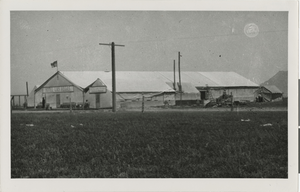
Photograph of the Hotel Las Vegas (Las Vegas), 1905
Date
Archival Collection
Description
The Hotel Las Vegas was the first hotel in Las Vegas, a tent set up for people who came to participate in the land auction. Managed by Pop Squires." Transcribed from back of photo: "Hotel Las Vegas 1905. Hotel Las Vegas, built by Las Vegas Trading Co. in 1905 was located on North Main Street between Stewart and the creek across from Woodards Down Town Camp on grounds later occupied by Elwells Ware House. All canvas and lumber used in building was cut to size and holes bored in Los Angeles, ready to be bolted together on arrival in Las Vegas. Hotel had 20 rooms. Floor space was 40 x 130 ft. Kitchen and Dining Room are seen next door to Hotel on the right. This Hotel was managed by Chas. P. Squires. Photo by Eddie Gillette, 1905." Transcribed from Special Collections sheet: "Selling of L.V. First L.V. Hotel pic cap. First Las Vegas Hotel -- The Hotel Las Vegas was made ready for the first buyers of real estate at the 1905 auction when the Las Vegas Trading Co., managed by Charles (Pop) Squires, opened the registry. All canvas and lumber used in building was cut to size and holes bored in Los Angeles, a prefab forerunner. Hotel Las Vegas boasted 20 rooms and was regarded as the top 'night spot' of its day."
Site Name: Hotel Las Vegas
Address: 1 Fremont Street
Image

